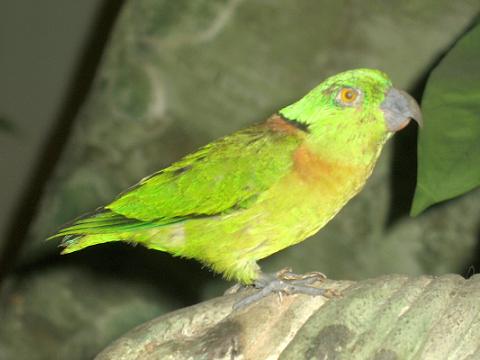|
| Query: Agapornis | Result: 2nd of 45 | |
Black-collared Lovebird (Agapornis swindernianus) - Wiki
| Subject: | Black-collared Lovebird (Agapornis swindernianus) - Wiki
| |

| Resolution: 480x360
File Size: 21321 Bytes
Upload Date: 2007:08:10 14:32:14
|
Black-collared Lovebird
From Wikipedia, the free encyclopedia
[Photo] Description: Black-collared Lovebird - Location: American Museum of Natural History, New York - Author: User:Stavenn http://commons.wikimedia.org/wiki/User:Stavenn
The Black-collared Lovebird, Agapornis swindernianus also known as Swindern's Lovebird is a small, up to 13cm long, parrot in the genus Agapornis. It has a green plumage with black-collared nape, brownish red chest, greyish black bill, yellow iris and grey feet. Both sexes are similar.
The Black-collared Lovebird is distributed in equatorial Africa. It inhabits the forests of Cameroon, Central African Republic, Congo, C??te d'Ivoire, Equatorial Guinea, Gabon, Ghana, Liberia and Uganda.
There are three subspecies of the Black-collared Lovebird:
- The nominate subspecies, A. s. swindernianus - Liberia, C??te d'Ivoire and Ghana
- Cameroon Black-collared Lovebird, A. s. zenkeri - Cameroon, Gabon and Congo
- Ituri Black-collared Lovebird or Emin's Lovebird, A. s. emini - Democratic Republic of the Congo and Uganda.
The Black-collared Lovebird was discovered by Heinrich Kuhl in 1820. The name commemorates the Dutch professor, Theodore van Swinderen of University of Groningen.
Black-collared Lovebirds hide high in the forest canopy and are characterized as being very shy. Black-collared Lovebirds can't normally breed well in captivity. As a result of their inability to thrive in captivity, they are rarely kept as pets.
One of the primary problems with trying to breed a Black-collared Lovebird is the unique diet that is required. Black-collared Lovebirds require certain native fig seed or fig flesh as a basis of their daily diet, without these vital dietary necessities Black-collared Lovebirds kept in captivity died within days. Because of this reason, many feel the Black-collared Lovebird may never be able to adapt to life in captivity.
Widespread throughout its large range, the Black-collared Lovebird is evaluated as Least Concern on the IUCN Red List of Threatened Species.
http://en.wikipedia.org/wiki/Black-collared_Lovebird
| The text in this page is based on the copyrighted Wikipedia article shown in above URL. It is used under the GNU Free Documentation License. You may redistribute it, verbatim or modified, providing that you comply with the terms of the GFDL. |
|
^o^
Animal Pictures Archive for smart phones
^o^
|
|